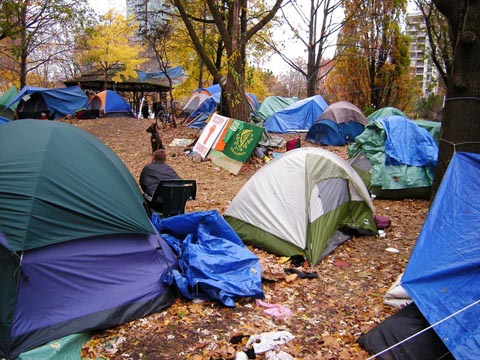As an eviction notice looms over Occupy Toronto, some fear that the loss of the tent city could be devastating for participants with mental health issues who have found themselves in a supportive atmosphere they don’t often find in the outside community.
Gail Trottman is a social worker who leads the Health and Wellness team — a mental health peer support system, staffed by Occupy volunteers — at Occupy Toronto. She is worried that the anxiety around eviction could trigger a crisis for people who have mental health issues in the park. “With the eviction notice coming up earlier this week, we started to notice people were more tense,” she says.
rabble.ca talked to occupants and participants in the protest who self-identify as having mental health issues or addiction. Here’s what the protest — and potential eviction — means to three of them.
Tamara Dippel: I have no clue how I’m going to react
Tamara Dippel is a participant in Occupy Toronto who identifies as having mental health issues including social anxiety.
“What people don’t realize about what’s going on is people like me and others who have illnesses are putting our lives on the line,” she says. “We know we can’t handle things the way other people can.”
Dippel says she’s drawn to Occupy Toronto because she sees problems with the current economic system. She’s now concerned about the lack of stability that could result from an eviction, especially for those with mental health issues.
“I’m really worried about the mental health of people here,” she says. “These people are very vulnerable. We have a hard time handling conflict and we have a hard time handling stress.”
Dippel says she’s particularly worried that about police involvement. She says she fears that the police will “come in and wreck things,” which she thinks could affect people with mental health issues strongly.
“They’re certainly going to be affected very differently, and it’s certainly not going to be in a healthy way, which could cause a crisis.”
“I have no clue how I’m going to react,” Dippel says. “This might be very rough for me.”
Rob Barker: There’s no other place to turn
Rob Barker is a protester who says he left his business to join Occupy London (Ont.) before coming to Occupy Toronto. Barker says the movement has begun to do the work the outside world won’t.
“Right now there’s really no other place to turn,” he says. “A lot of them have been turned away from mental institutions because apparently they’re not mentally unstable enough. And that’s not true.”
He describes the positive support he’s experienced.
“Here, everyone is accepted no matter what their mental health situation is,” says Barker. “We try to help everybody out.”
Barker, who identifies as having multiple personality disorder and depression, says that Occupy has become a place where people with mental illnesses of all kinds are respected.
He does concede that the high volume of people in the park who have mental health issues can pose a challenge.
“We have a few … who don’t want to do anything, but what can you do,” he says.
Jordan: We are part of the 99 per cent
Jordan, who asked to be only identified by his first name, said that the movement was in the process of becoming a place for people with mental issues to start advocating for themselves. Jordan, who struggles with addiction, says, “what we add is a voice to that space we are part of the 99 per cent.”
“If we’re going to be talking about equality for the 99 per cent we have to talk about equality for people who don’t have it,” he says. “And people with mental health issues and addictions definitely don’t have that.”
Jordan’s not naïve about the challenges of educating people on how to coexist with people who have addictions and mental health issues. “The behaviour can be disruptive,” he says. “The behaviour can be attention-getting … it can be a lot of things, and sometimes people don’t know how to deal with that.”
But Jordan also says he thinks the tent city is a place where people choose to learn. “I’ve watched as [General Assembly] after [General Assembly] has happened, and people have made the effort to say, “No, we’re not going to treat people with mental health and addictions the way they’re treated out there. We’re not going to ostracize them,'” he says.
“The people here are working on it, instead of just shunning us or saying we’re not desirable.”
When asked how he expects police will treat people with mental healthy issues and addictions, Jordan says, “I have no idea…I know they don’t always get the best treatment from police, so that’s something to think about.”
Katie Toth is a Toronto-based writer/journalist who reports on queer issues and issues if disability. Follow her tweets at @kat_toth.



